Related Research Articles

Cambridge is a university city, non-metropolitan district and the county town of Cambridgeshire, England. It is located on the River Cam approximately 55 miles (89 km) north of London. As of the 2021 United Kingdom census, the population of Cambridge was 145,700. Cambridge became an important trading centre during the Roman and Viking ages, and there is archaeological evidence of settlement in the area as early as the Bronze Age. The first town charters were granted in the 12th century, although modern city status was not officially conferred until 1951.
University College London, which operates as UCL, is a public research university in London, England. It is a member institution of the federal University of London, and is the second-largest university in the United Kingdom by total enrolment and the largest by postgraduate enrolment.

The Department for Culture, Media and Sport (DCMS) is a department of His Majesty's Government, with responsibility for culture and sport in England, and some aspects of the media throughout the UK, such as broadcasting.

Arts Council England is an arm's length non-departmental public body of the Department for Culture, Media and Sport. It is also a registered charity. It was formed in 1994 when the Arts Council of Great Britain was divided into three separate bodies for England, Scotland and Wales. The arts funding system in England underwent considerable reorganisation in 2002 when all of the regional arts boards were subsumed into Arts Council England and became regional offices of the national organisation.

The Metropolitan Borough of Bury is a metropolitan borough of Greater Manchester in England. It is north of Manchester, to the east of Bolton and west of Rochdale. The borough is centred around the town of Bury but also includes other towns such as Ramsbottom, Tottington, Radcliffe, Whitefield and Prestwich. Bury bounds the Lancashire districts of Rossendale and Blackburn with Darwen to the north. With a population of 193,823 in 2021, it is the smallest borough in Greater Manchester.

Chetham's Library in Manchester, England, is the oldest free public reference library in the English-speaking world. Chetham's Hospital, which contains both the library and Chetham's School of Music, was established in 1653 under the will of Humphrey Chetham (1580–1653), for the education of "the sons of honest, industrious and painful parents", and a library for the use of scholars. The library has been in continuous use since 1653. It operates as an independent charity.

The National Library of Ireland is the Republic of Ireland's national library located in Dublin, in a building designed by Thomas Newenham Deane. The mission of the National Library of Ireland is "To collect, preserve, promote and make accessible the documentary and intellectual record of the life of Ireland and to contribute to the provision of access to the larger universe of recorded knowledge."

The Petrie Museum of Egyptian Archaeology in London is part of University College London Museums and Collections. The museum contains 80,000 objects, making it one of the world's largest collections of Egyptian and Sudanese material. It is designated under the Arts Council England Designation Scheme as being of "national and international importance".
The Museums, Libraries and Archives Council (MLA) was until May 2012 a non-departmental public body and registered charity in England with a remit to promote improvement and innovation in the area of museums, libraries and archives. Its functions spanned the UK and it advised the government on policy and priorities for these areas in England, receiving funding from the Department for Culture, Media and Sport (DCMS). The last chairman was Sir Andrew Motion and last chief executive officer (CEO) was Roy Clare CBE.

The Whipple Museum of the History of Science is a museum attached to the University of Cambridge, United Kingdom, which houses an extensive collection of scientific instruments, apparatus, models, pictures, prints, photographs, books and other material related to the history of science. It is located in the former Perse School on Free School Lane, and was founded in 1944, when Robert Whipple presented his collection of scientific instruments to the University of Cambridge. The museum's collection is 'designated' by the Museums, Libraries and Archives Council (MLA) as being of "national and international importance".
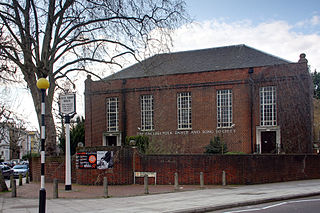
The Vaughan Williams Memorial Library (VWML) is the library and archive of the English Folk Dance and Song Society (EFDSS), located in the society's London headquarters, Cecil Sharp House. It is a multi-media library comprising books, periodicals, audio-visual materials, photographic images and sound recordings, as well as manuscripts, field notes, transcriptions etc. of a number of collectors of folk music and dance traditions in the British Isles. According to A Dictionary of English Folklore, "... by a gradual process of professionalization the VWML has become the most important concentration of material on traditional song, dance, and music in the country."
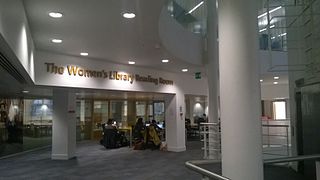
The Women's Library is England's main library and museum resource on women and the women's movement, concentrating on Britain in the 19th and 20th centuries. It has an institutional history as a coherent collection dating back to the mid-1920s, although its "core" collection dates from a library established by Ruth Cavendish Bentinck in 1909. Since 2013, the library has been in the custody of the London School of Economics and Political Science (LSE), which manages the collection as part of the British Library of Political and Economic Science in a dedicated area known as the Women's Library.

The Durham University Library is the centrally administered library of Durham University in England and is part of the university's Library and Collections department. It was founded in January 1833 at Palace Green by a 160 volume donation by the then Bishop of Durham, William Van Mildert, and now holds over 1.6 million printed items. Since 1937, the university library has incorporated the historic Cosin's Library, founded by Bishop Cosin in 1669. Cosin's Library and the Sudan Archive held at Palace Green Library are designated collections under Arts Council England's Designation Scheme for collections of national and international significance; two collections at Durham University Oriental Museum, the Chinese collection and the Egyptian collection, are also designated.
Manuscripts and Special Collections is part of Libraries, Research and Learning Resources at the University of Nottingham. It is based at King's Meadow Campus in Nottingham in England. The university has been collecting manuscripts since the early 1930s and now holds approximately 3 million documents, extensive holdings of Special Collections, and the East Midlands Collection of local material, all of which are available for researchers to use in the supervised Wolfson Reading Rooms.
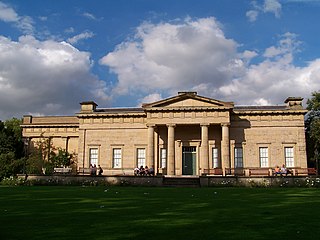
The Yorkshire Museum is a museum in York, England. It was opened in 1830, and has five permanent collections, covering biology, geology, archaeology, numismatics and astronomy.
The Oriental Museum, formerly the Gulbenkian Museum of Oriental Art and Archaeology, is a museum of the University of Durham in England. The museum has a collection of more than 23,500 Chinese, Egyptian, Korean, Indian, Japanese and other far east and Asian artefacts. The museum was founded due to the need to house an increasing collection of Oriental artefacts used by the School of Oriental Studies, that were previously housed around the university. The museum's Chinese and Egyptian collections were 'designated' by the Museums, Libraries and Archives Council (MLA), now the Arts Council England as being of "national and international importance".
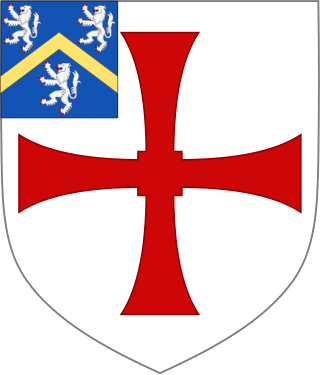
Durham University is a collegiate public research university in Durham, England, founded by an Act of Parliament in 1832 and incorporated by royal charter in 1837. It was the first recognised university to open in England for more than 600 years, after Oxford and Cambridge, and is thus, following standard historical practice, the third-oldest university in England. As a collegiate university, its main functions are divided between the academic departments of the university and its 17 colleges. In general, the departments perform research and provide teaching to students, while the colleges are responsible for their domestic arrangements and welfare.
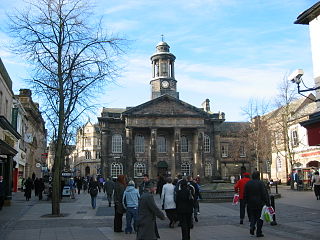
Lancaster City Museum is a museum in Lancaster, Lancashire, England. It is housed in the former Lancaster Town Hall building in Market Square.

Leeds Museums and Galleries is a museum service run by the Leeds City Council in West Yorkshire. It manages nine sites and is the largest museum service in England and Wales run by a local authority.
Leeds University Library's Gypsy, Traveller and Roma Collections are one of the five Designated collections held by the Brotherton Library at the University of Leeds. They comprise an extensive range of international books, manuscripts and archives relating to Gypsy, Traveller and Roma culture. Most of the collections are not about or by the communities but relate to the way they have been represented in the past.
References
- ↑ "Arts Council - Designation Scheme". Archived from the original on 18 July 2012. Retrieved 10 August 2012.
- ↑ "Designated Collections | Arts Council England". www.artscouncil.org.uk. Retrieved 23 March 2023.
- ↑ The first stately museum of England, The Independent .
- ↑ "Arts Council - Museums and libraries formally transfer to Arts Council England". Archived from the original on 9 January 2013. Retrieved 10 August 2012.
- ↑ "Cambridge University plant collection awarded Designated status". BBC News - Cambridgeshire. 1 June 2022. Retrieved 12 October 2022.
- ↑ Garget, Jacqueline (31 May 2022). "Cambridge University Herbarium gains national significance accolade". University of Cambridge. Retrieved 12 October 2022.